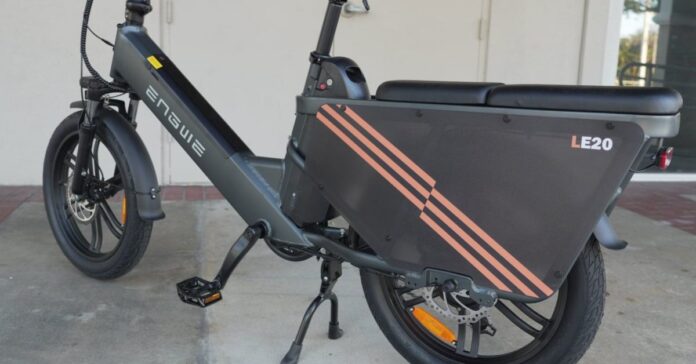The Engwe LE20 is an interesting take on the cargo e-bike format. It’s marketed as a budget-friendly utility e-bike that can handle hauling groceries, gear, or even a passenger. At the same time, it looks like a cross between a compact cargo bike and a semi-fat tire hybrid-style bike, with a chunky frame, small wheels, and a long rear rack. But how does it actually perform in the real world? After spending some time riding and testing it, here’s what I found.
For such an interesting low-cost, long-range cargo e-bike, you’ll definitely want to see what it’s like to ride this one.
Check out my video review below for the full experience!
Engwe LE20 Video Review
Engwe LE20 2.0 tech specs
- Motor: 750W geared hub motor in the rear wheel
- Top speed: 45 km/h (28 mph) on pedal assist, 32 km/h (20 mph) on throttle
- Range: Claimed up to 160 km (100 mi) on single battery (or twice that with dual batteries)
- Battery: One or two 48V 19.2Ah (920 Wh) batteries
- Weight: 41.5 kg (91.5 lb)
- Max load: 200 kg (440 lb)
- Brakes: Hydraulic disc brakes on 180 mm rotors
- Extras: Long rear rack, beautiful color LED display, integrated head/tail/brake LED lights with turn signals, fender set, kickstand
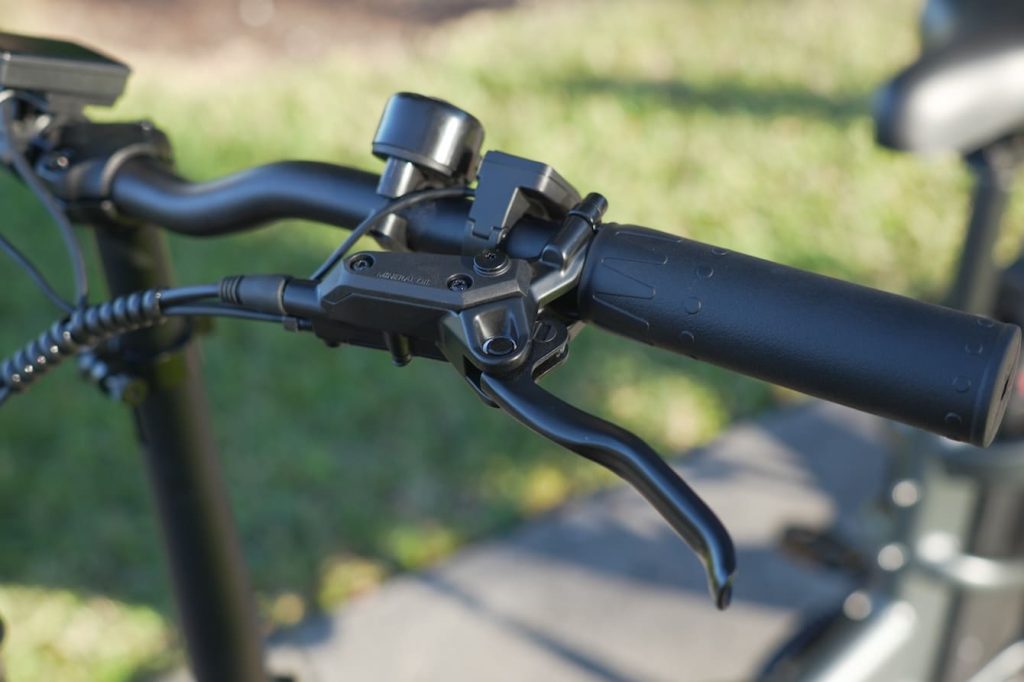
Power and performance
The Engwe LE20 is powered by a 750W rear hub motor (peaking at 1,300W), and I have to say, it packs more punch than I expected. With 75Nm of torque, acceleration is smooth but strong, especially when using the throttle. On flat terrain, it easily cruises at 20 mph (32 km/h) on throttle alone, and with pedal assist, it can reach 28 mph (45 km/h).
One of the things I really liked about the ride was the torque sensor. Many budget e-bikes rely on cheap cadence sensors, and to be fair, Engwe has floated by on cadence sensors in the past. Cadence sensors aren’t bad per se, but the cheaper ones can feel extra laggy and they are often combined with poor controller programming that results in lurching and jumpy acceleration. As a nice change, the LE20’s torque sensor responds quickly to input, giving it a much more natural and intuitive ride feel. It just feels more like you’re riding a bike with strong legs, than that you’re on a jumpy motorbike.
Testing the bike in Florida, I didn’t have much of a chance to do any real hill climbing performance tests, buts with 75 Nm of torque and good power, I have to imagine that it will handle moderate inclines well. For steeper hills though, you’ll usually want to pedal along with hub motor-based electric bikes like these since the motor can’t drop into lower gears like a mid-drive.

Battery for days… and days
The LE20 comes with a 48V 19.2Ah battery, which is quite respectable for a cargo e-bike at this price point. Most cargo e-bikes cost more and have less battery, so Engwe starts strong there. The company claims a 109-mile range, but as with all e-bike range estimates, that’s in the lowest assist setting with ideal conditions. In real-world riding, using a mix of throttle and pedal assist, I would expect the range to be closer to 30-50 miles, which is still solid.
For those who need more range, Engwe offers an optional second battery, which could theoretically double the range. If you’re using this bike for delivery work or long-haul commutes, that second battery might be worth considering.
I tested the dual battery version, and I should point out that unlike most dual battery e-bikes, the Engwe shows the charge level of both batteries on the display. That’s a cool feature and will be important for cases where you might have forgotten to charge one of the batteries. You’ll instantly know it when you see one is nearly full while the other is approaching empty.
The display is also really nice. I’d say it has no businesses being this nice looking on a budget bike, but the colors and layout make it very slick look and easily readable.
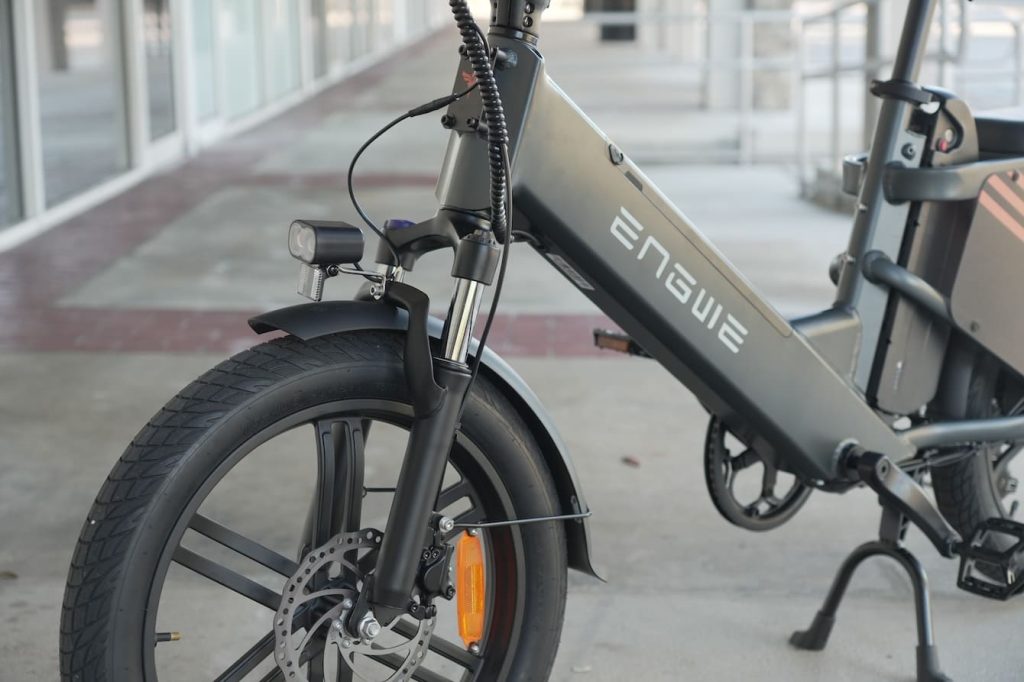
Cargo and Utility
The LE20 is certainly designed first and foremost as a cargo e-bike, and while it does have a large rear rack, it’s not quite as robust as traditional long-tail cargo bikes. That said, the 440 lbs (200 kg) payload capacity means it can carry a fair amount, assuming that’s accurate. I always have to wonder a bit, especially when budget companies list the same or higher weight ratings than industry leaders such as Tern, who puts a lot of emphasis on accurate weight ratings. I’m not sure I’d run it with 440 lb of weight on it every day, but perhaps that’s just me being conservative with an admittedly budget-brand electric bike.
The long rear rack does offer some nice space for mounting accessories such as a child safety seat, though I like the passenger deck pads that work just as well for kids and adults. Engwe also sells varioius storage cases and other cargo accessories. Mine didn’t come with footrests, but I think the standard package includes them now.
One major inconvenience that I did NOT like about the cargo design is that the side panels are so massive that they cover every bit of exposed frame rail in the back. That means I’ve got nothing to lash to when I want to carry cargo. I did a mail run and had a couple packages that I needed to carry back with me, and ended up having to secure them to the rack by tying off to the derailleur guard, of all places. Obviously that’s not ideal, and I wish Engwe had left us a bit more frame rail to work with.
You can see my jury-rigged rigging in the video review above. It works, but it’s not ideal from a cargo standpoint.
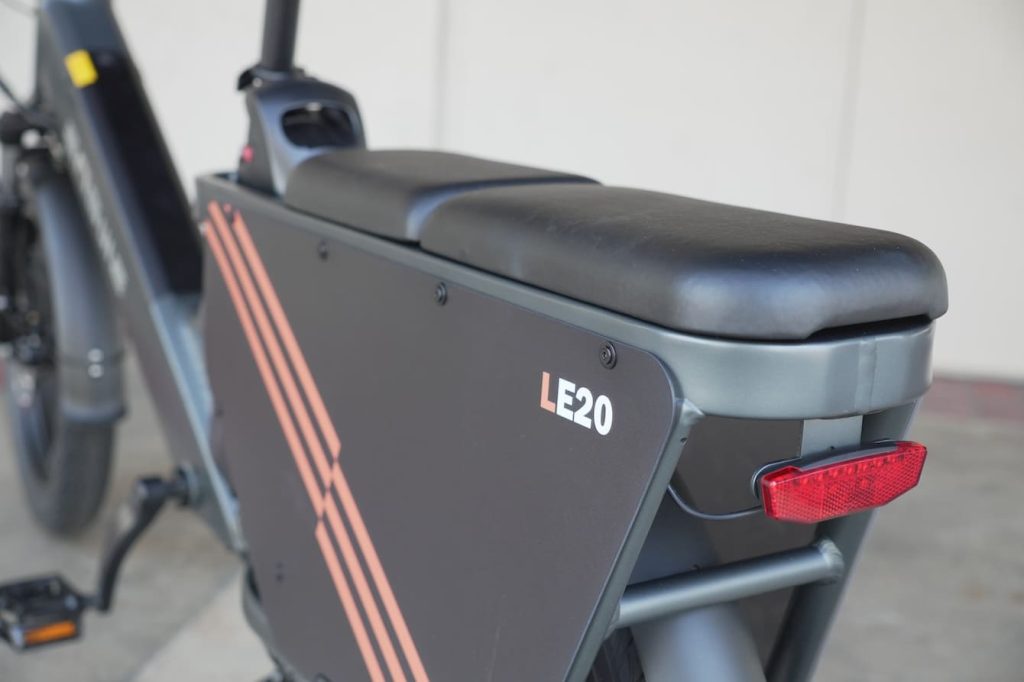
Ride comfort and handling
For a cargo bike, the LE20 rides pretty well, thanks to its front suspension fork and 20×3.0-inch tires. The smaller wheels make it more maneuverable in tight spaces, but they also make bumps slightly more noticeable compared to a larger-wheel cargo bike. I always prefer smaller wheels on cargo bikes though, since I’ll take the lower center of gravity over the better rolling comfort. And the semi-fat design of the 3-inch tires adds back some comfort to the mix. The cast wheels are also a nice addition, even if they are probably a bit more rigid than spoke wheels, but at least they’re maintenance free and look cool, too!
The step-through frame makes getting on and off the bike easy, especially if you’re carrying cargo. The seat is decently comfortable, and the upright riding position feels natural.
However, at 91.5 lbs (41.5 kg), it’s not a lightweight bike by any stretch of the imagination! You definitely feel that weight when maneuvering it around in a garage or parking, and even when riding around at low speeds.
At higher speeds, you generally don’t notice the extra weight, and of course, one of the benefits of an electric motor is that you don’t have the same weight penalty as a traditional bike. But lordy lord help you if you ever want to lift it onto a bike rack or carry it up a flight of stairs.
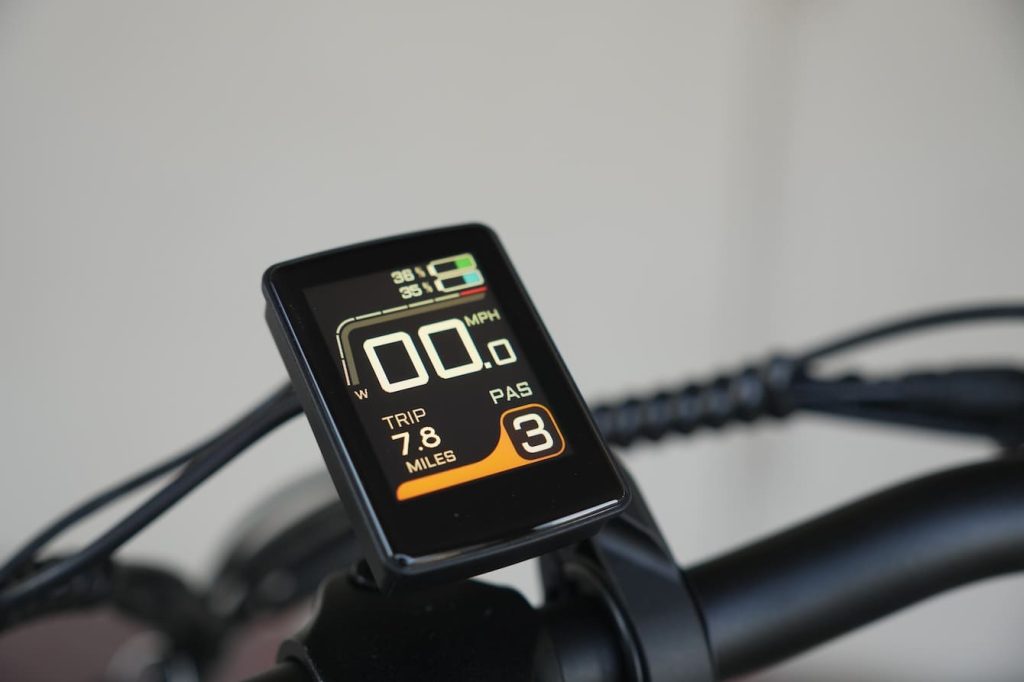
Brakes and safety features
Braking is handled by 180 mm hydraulic disc brakes, which offer strong stopping power. Given the weight and speed of this bike, hydraulic brakes are a necessity, and I was happy to see that Engwe didn’t cut corners here.
Another major safety feature is lighting, and the LE20 comes with integrated lights that run off the main battery. This isn’t exactly a technological feat, but some e-bikes still use lights with their own separate batteries, so I’m glad to see we at least make use of that massive e-bike battery for the lighting.
The dual-barrel headlights seem plenty bright as a be-seen light, but don’t expect them to solely light up the path on a moonless night with no street lights. For visibility though, I don’t think cars will miss you.

Final thoughts
For just $1,295 for the base model or $1,595 for the dual battery version, this is a great price for a super long range cargo e-bike.
Yes, it’s got some small issues. I’d probably just remove the rear guards to give me access to frame rails in the rear, though I accept that they’re a safety feature and so I’d rather just seem them a bit smaller. And it’s heavy as all get out. But at this price, you’re getting some serious performance and lots of cargo space.
The nice features like a torque sensor and beautiful display add significant value on what should be an otherwise unremarkable bargain-priced electric bike, so this one actually surprised me in a good way.
I’m not saying there aren’t better options out there, and the Lectric XPedition 2.0 for just an extra $100 has a lot going for it (even if the battery isn’t as big). But for $1,295, the Engwe LE20 is definitely compelling as a long-range cargo e-bike.
